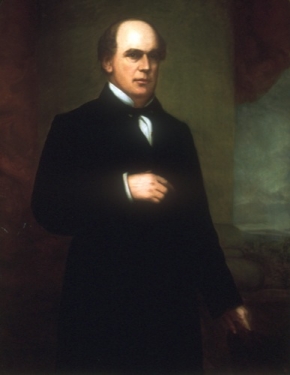You are here
Circuit Court Opinions:
Chief Justice Salmon Portland Chase, Case of Davis (1867–1871)

Case of Davis, 7 F. Cas. 63 (C.C.D. Va. 1867–1871) (No. 3,621a) [Fourth Circuit]
Jefferson Davis, the former president of the Confederate States of America, was indicted for treason in the U.S. Circuit Court for the District of Virginia in 1866. In May 1867, U.S. District Judge John C. Underwood granted Davis’s release on bail, as he had been held in military custody for two years without trial. Chief Justice Chase had contributed to the delay by his frequent absences from the circuit court. Some speculated that he was avoiding a trial for fear that a treason conviction for Davis would hurt Chase’s chances to run for president as a Democrat.
In July 1868 the Fourteenth Amendment was ratified. In November, Davis’s counsel appeared before Chase and Underwood to argue that the amendment mandated the dismissal of the treason charge. Section 3 of the amendment barred from federal office anyone who had taken an oath of loyalty to the United States and subsequently participated in an insurrection against the government. Davis’s lawyers asserted that this constituted a criminal punishment for Davis, who had taken such an oath as a member of Congress. To prosecute him for treason, they argued, would violate the Constitution’s prohibition on double jeopardy by seeking to punish him twice for the same conduct.
On December 5, 1868, Chase and Underwood announced that they could not come to an agreement on the Fourteenth Amendment issue. Chase requested that the reporter of the case record his position that section 3 barred any further proceedings against Davis for treason. As a result of the divided court, the issue was sent to the Supreme Court for its ruling, but the Court did not act on it. On December 25, President Andrew Johnson issued a blanket pardon for those who had participated in the rebellion, ending Davis’s prosecution. The circuit court formally dismissed the indictment in 1871.
